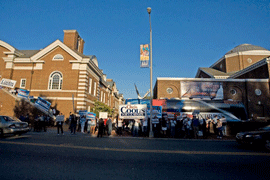by Staff Writer

Ashley Lavery just graduated with an Honors Degree with Distinction in Political Sciences, with a minor in Legal Studies.
This fall Ashley Lavery split her time between taking classes, working in the Honors office and continuing her internship with the Homicide Unit of the Defender Association of Philadelphia. Ashley has been titled a “Mitigation Assistant”, but she has also had the chance to work with clients on her own. What is a mitigator you ask?
“The role of a mitigator in homicide cases is to be a strong support for the client through the judicial process, reach out to their families (who are often struggling as much or more than the client), gather information on the client’s life, including their educational, medical, social, and psychiatric records, work with experts, and compile packages to submit to the District Attorney’s office. These packages provide mitigating factors to the case and are used to get the death penalty off the table for a client, or hopefully negotiate a deal with the DA to get a term of numbers for a client,” explains Ashley.
For her job, Ashley has interviewed clients in each of the Philadelphia county jails, attended hearings, trials, sentencing proceedings and “unfortunately watched some of my favorite clients (for whom I’ve developed a tremendous amount of respect, as crazy as it might sound to some) being sentenced spend the rest of their lives in prison”.
How did she land this kind of gig? “I found out about the Defender Association through my uncle, who happens to be an incredible homicide detective in Philadelphia. He jokes about handing me over to the “dark side” (the defense).”
Ashley can’t say enough about how excited this job makes her. She loves that each day offers a different agenda, full of new experiences and challenges. “I learn something new every day and everyone in the unit is fabulous; everyone brings something fresh to the table” she says.
“The most challenging part of my job has been learning to pace myself and take a step back at times. I’m a total workaholic, and my supervisor has had to constantly warn me about burning myself out”. And of course there is always the question of how hard is it to work with alleged criminals every day? “I think when people ask that question they expect an answer like “oh, I can’t relate to these people who have committed murder…” The truth is, I can’t relate to their offense, but I can listen to their stories and get to know them for who they are, not for what they (may) have done.”
So what’s next for Ashley? “I was lucky to land a permanent position in Homicide Unit, but now my role has changed a bit. In addition to putting together life histories, I’m now doing a lot of investigation and research for the cases. The amount of information that everyone puts on Facebook & Twitter these days is out of control, and can be a good source of what’s really going on [in the streets] and with the witnesses, victim’s family members, and other people involved. I’m also doing a lot of research, which is so much easier after going through the thesis process during my last semesters at UD. It’s really gratifying to put my education to work. I also have applications in for graduate school for criminal justice/criminology, and then I plan on going to law school. Undergrad at UD was great, but I’m definitely looking forward to the next chapter.”

Ashley, who was also a Program Assistant in our office, opens her graduation present from the Honors staff











